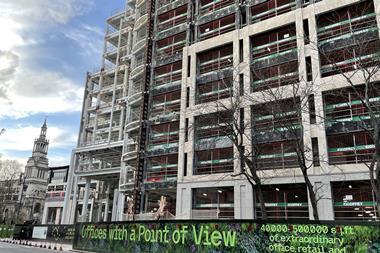Questions, questions, questions. This week, I chaired a Climate Crisis Challenge Spotlight Event, in collaboration with UKGBC, asking a big one: “How do we turn followship into leadership ahead of COP26?”.

The results of last week’s poll conducted ahead of the event suggest the industry is fairly bullish, certainly more so than it was at the height of the pandemic.
People will also be heartened by the US president’s commitment to double climate aid to developing countries. But what about this developed country? Fears are mounting ahead of COP26 that the escalating energy crisis – oh the irony of running out of CO2 as campaigning to slash carbon gathers momentum – will derail the climate agenda and propel us into a 70s-like winter of discontent.
If the nation’s priorities are reduced to ‘heating or eating?’, these fears may prove well founded – and it is not just the climate crisis that could find itself plummeting down the political agenda. While the industry has broadly welcomed the appointment of Michael Gove as secretary of state for levelling up, housing and communities, the sheer scale of his brief is, frankly, alarming – and housing has notably been relegated to second place.
Gove’s decision to pause what predecessor Robert Jenrick had billed as the biggest shake-up of the planning system in 70 years has already gone down badly with affordable housing campaigners, and what does it all mean for the 300,000-homes-a-year target? Is a reverse ferret under way?

Then there’s the hugely contentious issue of fire safety, which has come to the fore since the Grenfell tragedy and is now a major cause for concern in relation to an MMC hailed as a potential solution to the housing crisis: modular construction.
It is not just the difficulty inspecting modular units constructed off site that poses a problem, it is the materials used, the many subcontractors often involved (and the consequent challenges to quality control), the lack of expertise using such methods and, more worrying still, the lack of regulations and safety measures. As the Fire Brigades Union’s Andy Dark starkly puts it: “Fire and buildings research and regulations continue to be outstripped by techniques developed by the construction industry.”
Warnings that the industry could be sleepwalking into another Grenfell could well prompt developers to rethink their modular ambitions and slam the brakes on modular just as it is poised for take-off.
The future of another growing residential sector, co-living, is also in doubt following The Collective’s collapse into administration. Questions are inevitably being asked about the robustness of the model, although concerns have been somewhat assuaged by US player Common’s UK debut. While no one could have planned for a black swan event like Covid, now the pandemic has raised the bar on risk, does everyone now need to?
Another big question this week is what the future holds for RICS. Peter Bill is characteristically on point regarding the challenges. He does not, however, believe the institution has been as damaged as some think.
Perhaps not, but it has been damaged and will be licking its wounds for some time yet. Ditto its external legal adviser Fieldfisher, which Levitt concluded took a “partisan approach, siding with the executive against the four non-executive members without any objective analysis of the true merits of the situation”, prompting calls for it to pay back some of the money it was paid by RICS. Ouch.





























No comments yet